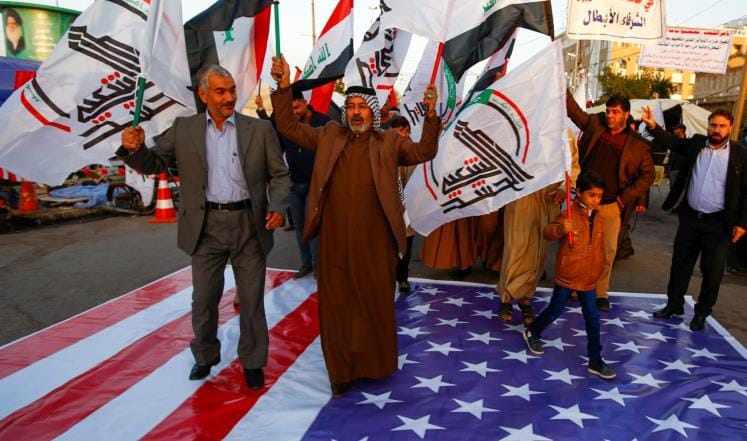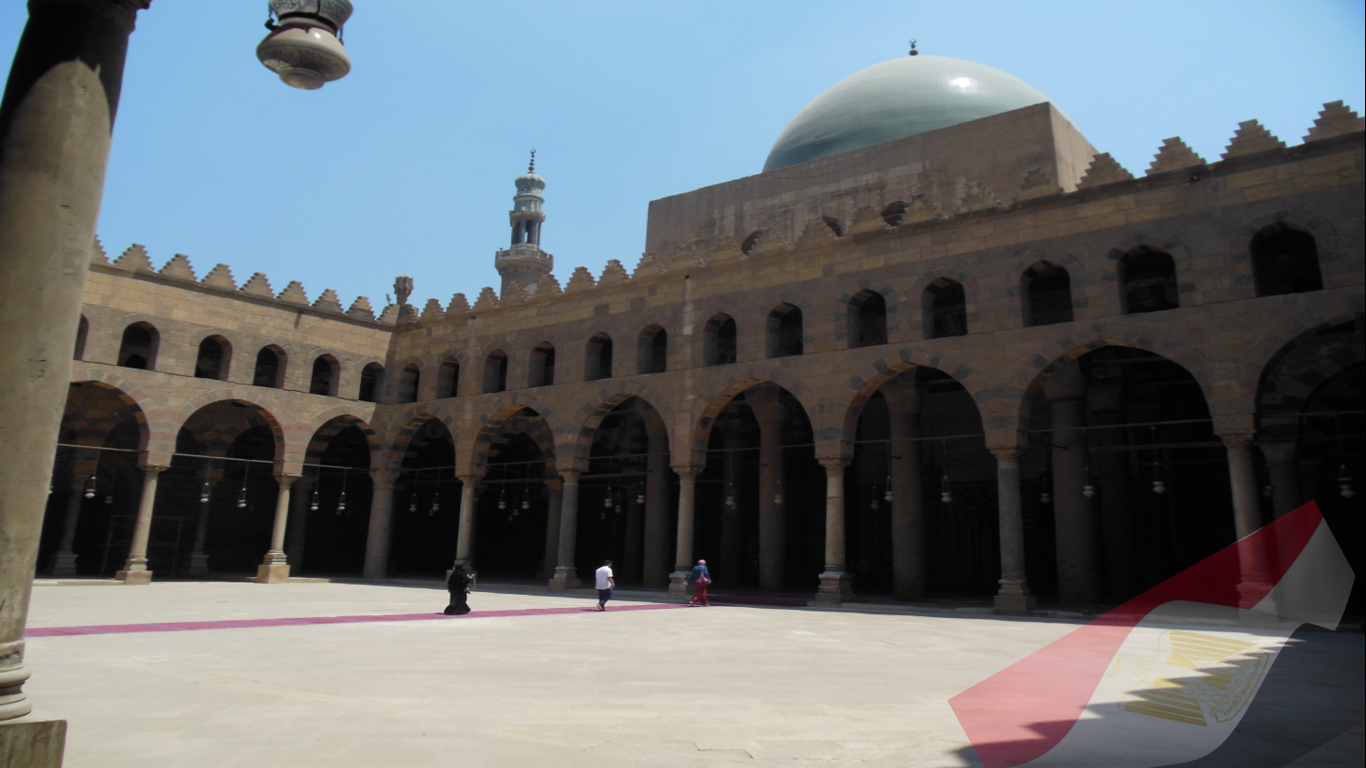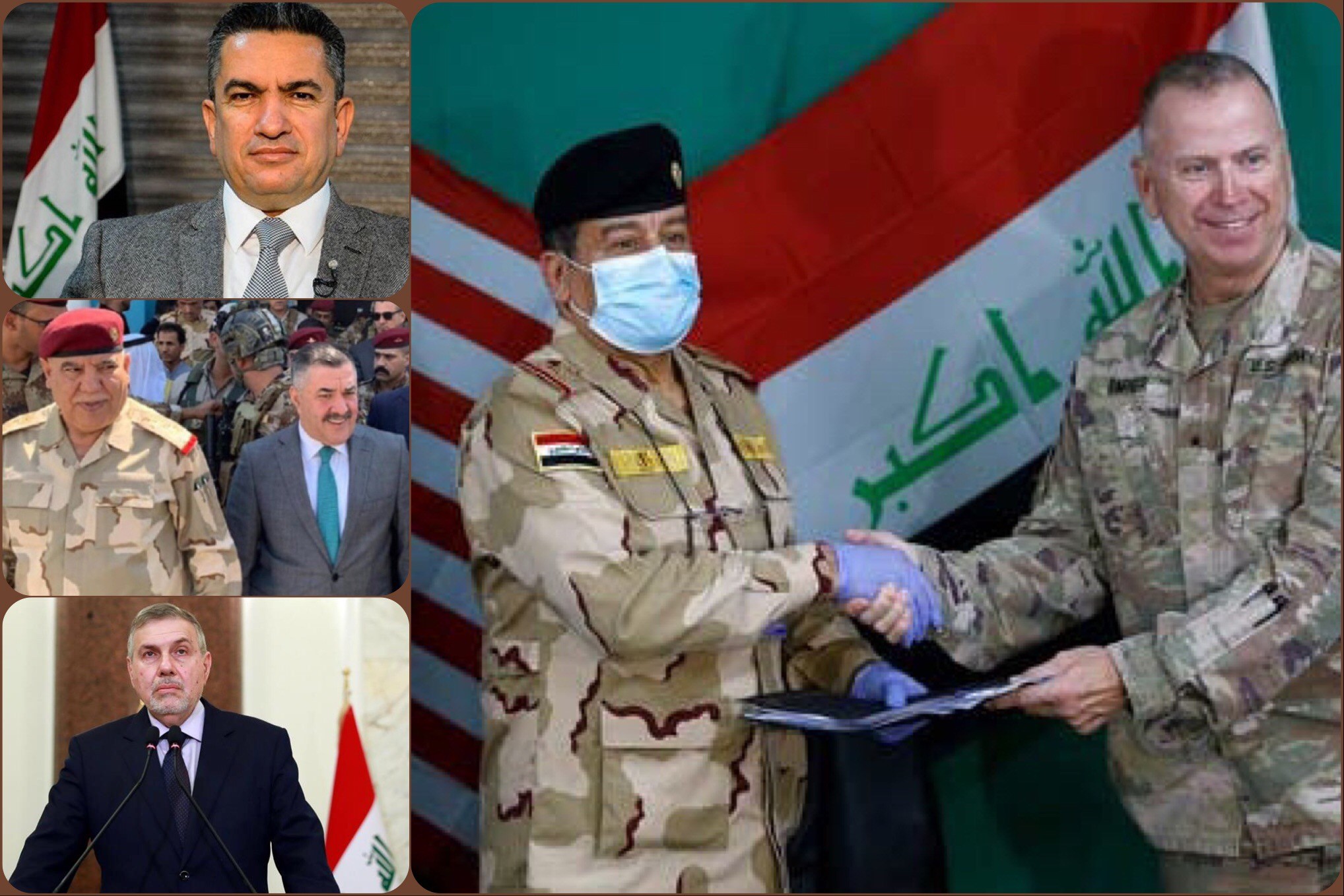Last week we finished out journey to the Yemeni scene for a while, thought there are big surprises ahead there. As only this week the leader of the Anṣār Allah Movement, ‘Abd al-Malik al-Ḥūtī held a lengthy speech, which in many ways can be regarded as a victory speech. And with his offer to release one Saudi pilot, the Yemenis are now offering possible new surprises.
Indeed the world seem to not care about big politics in these desperate days, as the whole world braces itself for the Corona Virus, and even more for the economic impacts of this huge crisis. The Arab world is no exception as the majority of the Middle East now only concentrates on the spread of the virus, and that is the leading topic in almost all political debates. Which could be even something positive, showing that in desperate time equally threatening all sides and all nations the Arab could stick together and show solidarity. There are nice examples for that, but in general, mostly those sides help each other, who stood together in the cataclysmic last decade.
The most pressing matters, thought they lost the limelight, are still on the move with many time gruesome and unbelievable revelations. The Turkish-Syrian struggle still goes on, regardless of the last Russian-Turkish deal. In Libya, only this week we came to see the first Turkish soldiers to die, and the first Syrian terrorists fighting for Ankara being taken captive there.
But this week an other segment of the so called Axis of Resistance, Iraq was busy. On one hand the long struggle for the post of Prime Minister after ‘Ādil ‘Abd al-Mahdī seems to have come to an end, yet with the election of a rather controversial figure. On the other the fight between the American occupational forces and segments of the Iraqi Army continued rather viciously, yet it seems to come to a conclusion. The Americans, thought still refusing to acknowledge the Iraqi state’s decision evicting them, are handing over military bases to the Iraqi Army. What’s more, on 26 March France announced its full withdrawal, officially because of the Corona threat. Which is ironic, given that the case in France is much worse than in Iraq, at least officially. While these are very promising signs and it seems Corona achieved more for the liberation of Iraq than the famed Iranian-Iraqi resistance, there are also news of possible military coup. Once again by America instigation. Especially in this context it worths to look over, who is ‘Adnān az-Zurufī, the new Iraqi PM designate, and what really happened between the Americans and the Iraqi in the last two, or so week. Because the new leader in Baghdad will determine, whether Iraq really rids itself from the American occupation, or not, and that once again as broad regional consequences.
At it flares up again
The last few weeks saw a renewed escalation, which have seen many waves by now. It started to flare up sine last summer, hit a peak with the murder of Soleymānī, and was relatively calming after the Iranian retaliation. On 11 March the American and British forces were attacked at the at-Tāğī Base just south of Baghdad, killing two American and one British soldiers dead. Which is ironically bigger that the Americans are willing to admit by the Iranian strike on the ‘Ayn al-Asad Base. Thought not officially admitted by any parties, but it is widely held that the Iraqi Ḥizb Allah Battalions are to be blamed, which is not only the closest party to the Iranians, but as a member of the al-Ḥašd aš-Ša‘abī, it is part of the formal Iraqi Army.
The American brutally reacted on 13 March hitting five positions in a number of air raids, killing three Iraqi soldiers – probable Iraqi Ḥizb Allah members – two policemen and a civilian. Thought a day earlier Trump’s advisors threatened with a reaction harder than the one killed Soleymānī. Seeing the result that hardly happened, thought infuriated the Iraqi, who are now officially complaining in the U.N. The hit indicates that the Americans don’t really know where to hit, and will hardly scare the Iraqis. And that point was perfectly proven on 14 March a second attack was done on the at-Tāğī Base seriously injuring another two Americans. And that come less than a month after the missile attack on the American embassy in Baghdad on 16 February.
Clearly tension is running high once again and it is spiraling out of control. The problem is that this has not limits now, as Iraq has no Prime Minister and the whole political class, thought the eviction of the Americans is a leading theme, is struggling for power now.
Prime Minister wanted
Ever since ‘Ādil ‘Abd al-Mahdī stepped down after the massive wave of protests, which started in October, the biggest question was who should, or who could follow him. And that became a particularly urgent matter after the American assassination of Irani General Qāsem Soleymānī and the Iraqi Deputy Chief of the al-Ḥašd aš-Ša‘abī Abū Mahdī Muhandis, as it was clear that Iraq is losing its own stature and became an open battlefield between the US and Iran. By now practically everyone outside of Iraq has already forgotten ‘Ādil ‘Abd al-Mahdī, which is a shame, because his lesson is important to understand just how delicate matter is now to find a new suitable PM for Iraq. And that is for a number of internal and external reasons.
Internally the main problem is that the system the American occupation left behind is such, which ensures that no parties, but even no coalition can gain full majority in the Parliament. That became especially apparent after the 2018 election, when the otherwise triumphant Shia blocks polarized around a handful of political and religious leaders, which all competed for power against one another. That is why one of the main demands of the protest wave in the last few months was the fundamental change of the electoral system, so to create stability. Most of the big parties merged to bigger coalition electoral lists, which was rather working fine for the Sunna and the Kurds, while the once overwhelming Shia Islamic Da‘wa Party fell apart. The competition between the two biggest Shia religious authorities continued and by 2018 this deadlock was met with another block, the heroes of the al-Ḥašd aš-Ša‘abī. Since none of these bigger blocks managed to create clear majority, even clear advance over the others, and since most of the more experienced old guard politicians managed to completely tarnish their reputation in the scandals and catastrophes of the last 17 years, it was clear that any major political group gaining the post of Prime Minister will immediately cause all other blocks joint forces against it and the country will meat a deadlock. Therefore in a balanced situation, like after the results of the 2018 elections a neutral person was needed. Especially by the outer factors.
Externally Iraq was for long being torn part between the Americans and the Iranians. For Tehran Iraq, home of most of the sacred Shia pilgrimage sites is extremely important, and it is a forward base, a bulwark to reach more reliable allies in Syria and Lebanon. In such sense influence over Iraq and the explosion of the American forces even before the Soleymānī assassination was a vital national security interest. Upon the same logic, as the current American administration, not as much Trump, but the hawks around him, like Pompeo and Bolton previously, viewed Iraq as the best possible place to bog Iran down in a long war of attrition and force it to surrender. That logic never changed, up to this day, and that is why even European partners were highly encouraged to join this effort, like France and the U.K., all having their own interests to have pressure on Tehran. Between the two, however, so far the Gulf also had its own agenda in Iraq, partly to create separate, or semi-independent vassalages in Iraq, thus thwarting Iranian expansion, while on the other hand many times viewed Washington not taking the matter seriously enough, tackling the Iranians head on in Baghdad. That showed perfectly when the Emirates was busy moving the recent protests, even thought they were components of an American plan.
Therefore choosing any Prime Minister was anything, but an easy challenge. Which was clear even almost a year ago, when we first assessed the Iraqi situation. Choosing ‘Ādil ‘Abd al-Mahdī was an uneasy balance between the major internal and external forces, reaching a compromise with a by then almost weightless figure with no serious party hinterland, from it could have been expected to run the country and not to lean to either side. Which he did relatively well, if we look at the pressure he had to face from both sides, and that is why he fell so quickly. Because no one really wished him to stay. The Americans were planning a military coup against him at least since the summer, and constantly undermined him with mysterious plane attacks on the al-Ḥašd aš-Ša‘abī camps. The Iranians were not much kinder with him, like when complete governmental delegations were touring Iraq and were not even meeting with him. Thought Trump also had this habit. With ‘Abd al-Mahdī finally left, it was the same deadlock to be solved as a year ago, but by now all matters were even worse. The protests stirred up tension, and the race between the pro-Iran and pro-American camps became even more severe. After the decision of the Iraqi Parliament to expel the American troops, the new PM not only had to start to rebuild a country with the economy, draft a new constitution and eradicate corruption, but also had to force the Americans to leave. All that, while maintaining equal distance from all outer forces, and having no major political party background to seem clean from corruption charges and not be held as a stooge for a given political block. And since choosing the PM is the sole prerogative of the President, thought the Parliament has to approve him, and there are still no clear guidelines for that procedure, President Ṣāliḥ has to deal with this task relatively alone.
His first choice was Muḥammad Tawfīq ‘Allāwī, a lesser known cousin of Iyyād ‘Allāwī, for long biggest rival of Nūrī al-Mālikī, who served as PM for almost a year between 2004 and 2005, and after much political struggle became Vice President between 2014 and 2018. Though once Iyyād was one of the biggest names in the Iraqi politics and the best asset of Washington, by now he and his family was running out of favor. They became symbols of the post-Ṣaddām era so full of trouble and incompetence. Tawfīq ‘Allāwī, much like his cousin, for long was in exile in the U.K. where he became a British citizen. Returned to Iraq and became MP in 2005. Thanks to his cousin and the deal cut between him and al-Mālikī, Tawfīq twice became Minister of Communication (2006-07/2010-12), both resigning claiming random and sectarian practices in the government. Since he was known for his anticorruption measures as a Minister, and for participating in several interfaith dialogues he could have seemed as ideal compromise.
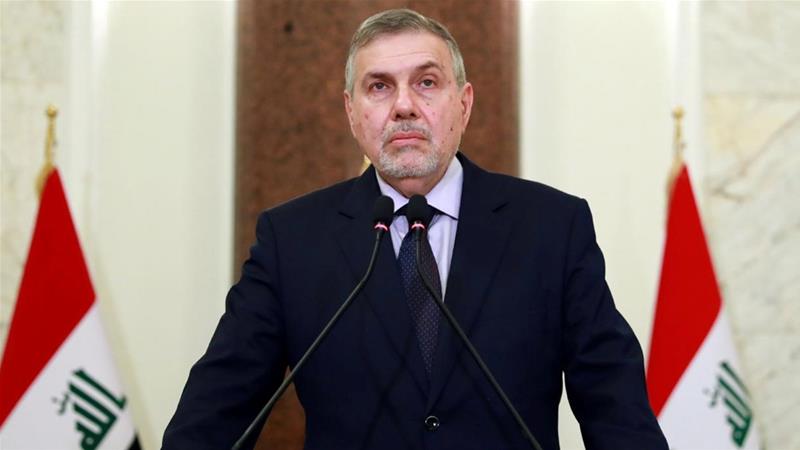
Especially that by now his powerful cousin has practically retired. However, for most he was just the same. A member of a corrupt era, member of the same corrupt power circle as his cousin, far from being a fresh start. President Ṣāliḥ nominated him as PM on February 1 after the two months deadlock, but almost immediately met with refusal. Not only by the protestors, their movement by now losing steam, but by the parties themselves, as ‘Allāwī was portrayed as a Western agent, unsuitable to rid Iraq from the American occupation. He immediately made a speech to the nation, but failed to secure support in the Parliament. On 19 February he made yet another speech to convince the MPs, but to no avail and on 1 March he revoked his candidacy. With his run sabotaged the major factions had another two weeks to come up with a candidate, as the ball was now in their field.
The next in line met with yet an even shorter carrier, being officially nominated as a compromise with tribal power support. He in Na‘īm as-Suhayl, a former cabinet chief of late President Ğalāl Ṭalabānī, a long time tribal coordinator. He is a close associate of Nūrī al-Mālikī and was viewed as his designated representative. With as-Suhayl practically al-Mālikī would have come back, which by now was not only favored, but even Tehran was not happy about it, as it was clear from the reactions of the pro-Iranian press. As-Suhayl was chosen on 15 March as PM candidate by the special committee of the 7 leading parties, thought there were many other possible names as well. His hopes, however, soon came short.
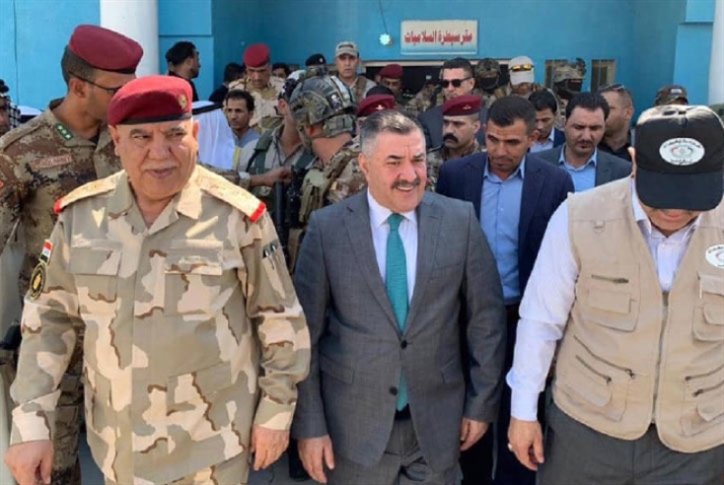
On 18 March the Iraqi President asked another possible candidate, ‘Adnān az-Zurufī to be the next Prime Minister. Thought the President chose on his own prerogatives, he could exploit the obvious political deadlock and that indeed there is a fundamentally different situation than two years ago. Therefore he appointed az-Zurufī as a caretaker for not more than a year, practically to organize elections. Az-Zurufī, an American dual citizen, was a typical example of the political class returning after 2003, and was personally appointed by Paul Bremer to be the governor of the holy city of an-Nağaf, which brought him into collusion with the powerful cleric Muqtadā aṣ-Ṣadr. This animosity is still alive today, especially now that az-Zurufī crossed over the last chances of aṣ-Ṣadr now to get into power, and because he was very much seen a decade ago as a man of the Americans. Though now he openly expressed his willingness to renounce his American citizenship that hardly helps him, as he is a man of former PM (2014-18) Ḥaydar al-‘Abādī, who was also considered to be a pro-American leader. By now practically only the President and the some Kurdish parties support him openly, as even Grand Ayatollah as-Sīstānī withdrew recognition.
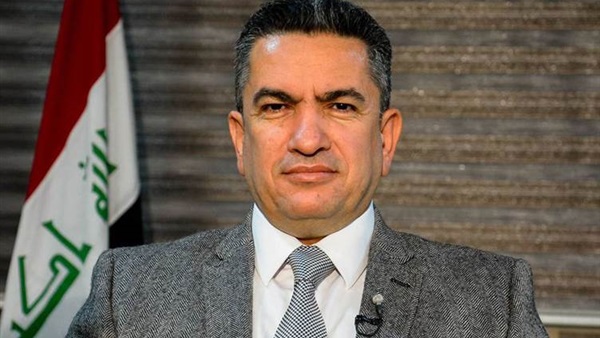
Therefore we can see a series of low profile characters running, staring with a neutral candidate of the old guard to a man of al-Mālikī to finally a pro-American candidate. Whether he will be able to secure support, or not matters little now, as at the end the President will simply designate him as interim PM until the next elections. Which is in fact a big loss for the pro-Iranian and anti-Western forces, since that gives almost a year to the Americans to disregard the decision of the Iraqi Parliament and still stay in the country. Or to secure another way to change the equation. However, as we could saw, some forces don’t wish to wait that long.
Iran too busy?
It is rather puzzling to see that after the moral triumph at the funeral of Soleymānī and al-Muhandis, and after hitting the American base the Iranians could not only use the momentum for their own favor, but their influence seem to recede. Not only their allies could not secure a PM of their fashion, but the Americans are not clear if they are leaving, or not. And if Iraq faces early elections, there will be at least another year until there is a new Iraqi government, which could finally have the authorization to expel the Americans. By that time there will be a completely new administration in charge in Tehran, as President Rōḥānī will have served his second term. And no one knows what sort of government will come in Tehran, which might just be too busy to really concentrate on Iraq.
One of the possible answers to this puzzle is the Corona epidemic, which for some reason seems to hit Iran harder than most regional states. That is probably true to a certain limit, but that is not the full answer. Corona provides a challenge and an opportunity for Iran. It hasn’t even really started to hit the US yet, and by all indications Iran will be over this wave than the Americans. Meaning it will be able to show itself more developed – American casualties are already higher than the Iranians – and can come to support of the region with aids. Also as far as Iraq, it is always difficult to glue together the different factions, and so far there is an irreconcilable rift between al-Mālikī and Tehran. And it was difficult for the Iranian to surpass both the Americans and al-Mālikī, while also focusing on the Corona matter. How tied up Iran is now is obvious, as for the first time since the revolution it asked help from IMF.
That, however, does not mean that Iraq is left unwatched. Thought it is only suspected, Tehran is probably not far from the recent actions against the American bases. And as news surfaced that Washington is once again planning a military coup in Iraq – which was sugarcoated as anti-terrorists, or anti-Iranian campaign, but admitted by the American press as well – it was also clear that the Iranians are in full alert, and cooperating very closely the al-Ḥašd aš-Sa‘bī. That is probably the explanation of the rather erratic behavior of the Americans now, hitting hard one day, and evicting camps on the other. Iran might be busy now, but not that busy and the Iraqi frontline is still wide open.
A chase for a base
As of January 2020 there were 12 official foreign military bases in Iraq. Some separate, and some are within existing Iraqi bases. The biggest one is the ‘Ayn al-Asad Base in al-Anbār, while the most strategically valuable ones are the al-Qā’im Base guarding the land crossing to Syria, and those around Baghdad.
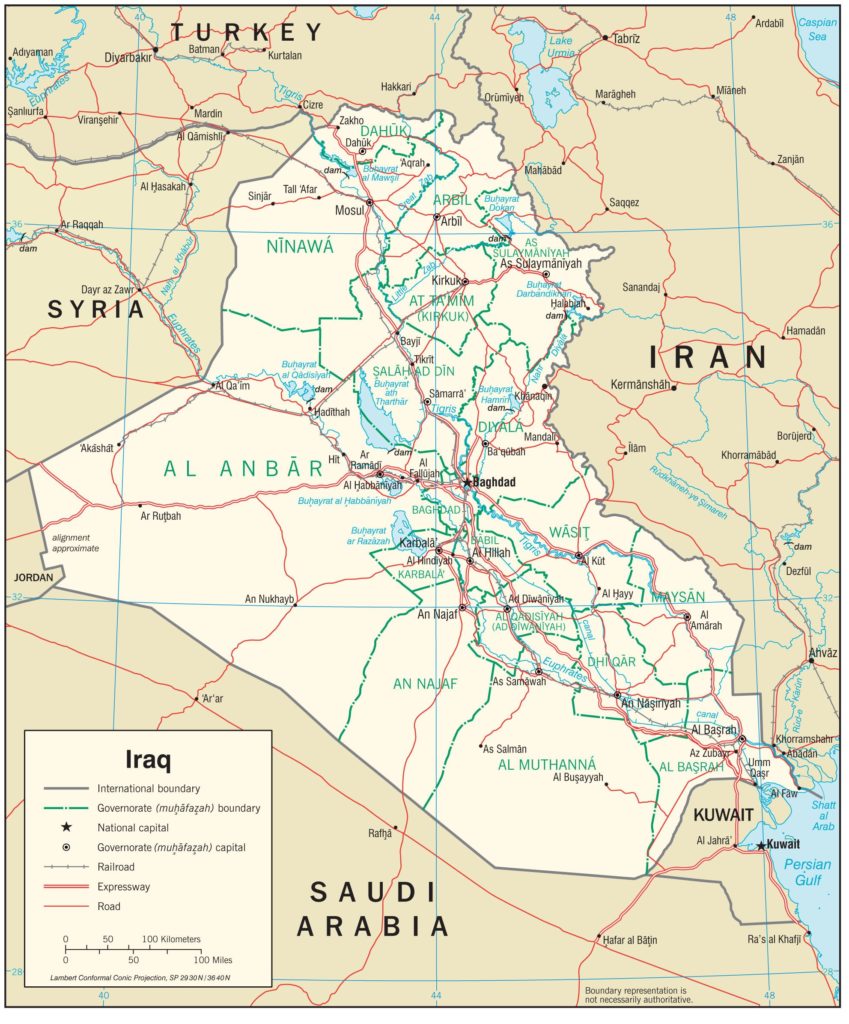
Seeing the severe retaliation by the Americans to the hits since December, risking a war with Iran by the Soleymānī assassination and even in the last round hitting back firmly, it is puzzling why the Americans announced to hand over three bases to the Iraqi Forces. And there are news of more soon. This time it is not even solely propaganda, as the al-Qā’im Base was handed over on 17 March 2020 to the Iraqi Army. While this was the most important point to block the Iranian-Iraqi-Syrian cooperation, that was also the main the supply depot for the invading forces in Syria. With this being handed over now the matter of the Syrian presence comes up once again. And if indeed the Americans are working on a military coup, or as they put it a major anti-Iranian campaign, than it is puzzling why are they giving up positions. The official line holds that these bases are in positions way to exposed attacks from within Iraq, but if there is any truth in it, it gives the image that the Iraqi resistance is achieving results.
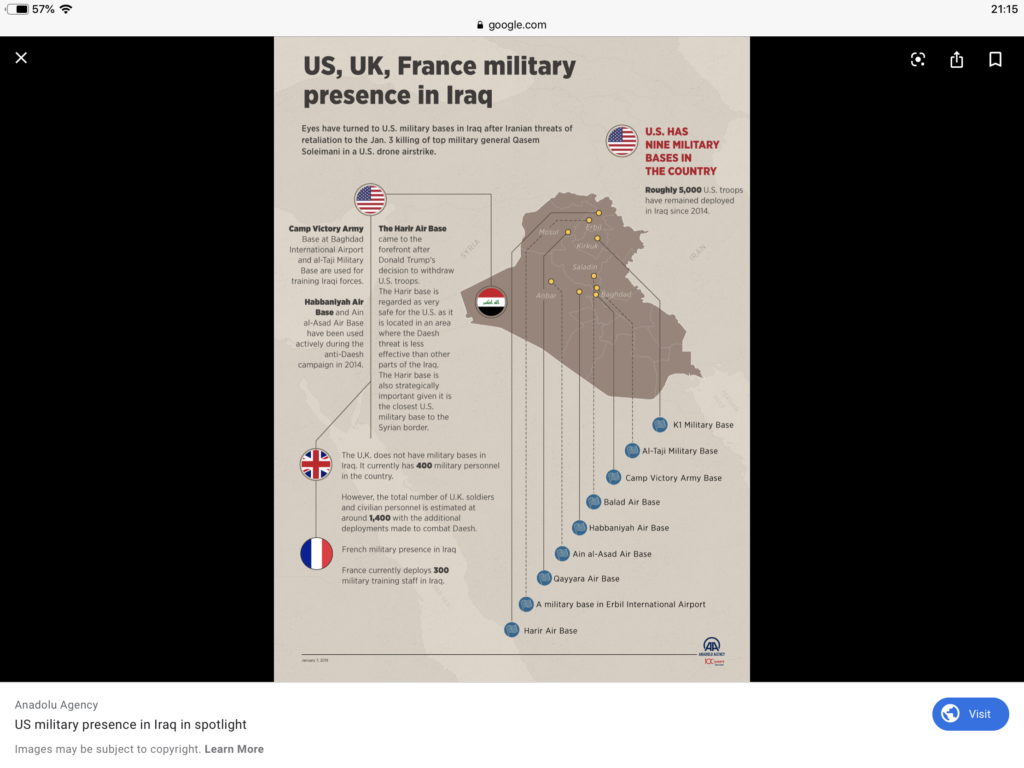
One possible answer is that the harsh rhetoric is only a smokescreen and Washington as accepted the reality that it has no political support in Baghdad, legality in not on its side now, and resistance will only grow. Recent revelations also indicate that the Americans were trying to defend their bases with the best possible air defense they have, but the result are less convincing. Some Arab assessments believe that it is only part of the psychological warfare and Trump is about to leave, before casualties really start to rise, escaping the inevitable.
The fact that the French are also leaving completely under the pretext of the Corona, also indicate a full withdrawal. It is just as much possible that these are signs of different segments of the Americans leadership some willing to fight more, while some suggesting a pull out.
Objectively, however, starting a new vicious campaign now would be huge loss. It wouldn’t solve the matter, as the pro-Iranian camp is deep rooted in Iraq, but would turn national sentiment against itself. It would unite parties against Washington, which is the lesson of the murder of Soleymānī. However, doing nothing is also not an option, as the intensity of the resistance is rising. Therefore the most likely scenario is a gradual concentration of forces to the most defendable bases, to slow down the operation to after the new American and Iraqi elections. With clear results a definite decision can be made. Nonetheless, it is clear that something big is in motion between Washington and Tehran.
Iraq matters
What happens in Iraq now, with both the new PM and the matter of the military bases does matter a lot. Not that much for Iraq itself, but much more for the region. The Saudis for example, did not want the Americans to leave already in January. For them it is a crucial matter. Especially now, as last week we could see that Riyadh is losing influence fast, and there are new indications suggesting that Trump is about to let Ibn Salmān go. With the Emiratis changing with the wind in Syria and in Libya that means the last support for the Saudi policies is about to be lost.
Even more, the election of the new Prime Minister will decide the faith of the country. If the Americans pull out, Iraq will join ranks with Syria and Iran irreversibly, causing shockwaves in the region and manifesting in a number of matters from Yemen to the Saudis, all the way down to the “Deal of the Century”.
More directly, the loss of supply routes from Iraq might seal the faith of the American presence in Syria. With the diplomatic moves reconciling with Damascus that is a likely scenario. That is why so far the Americans are concentrating to the more stabile Iraqi Kurdistan and supporting their presence in Syria from there. But with growing resistance that is getting ever more unsustainable.
The daily Iraqi politics and the PM casting might be hard to follow now, but much more hangs in the balance now. For the whole region, but for Iraq the slow grinding will continue for a while.
